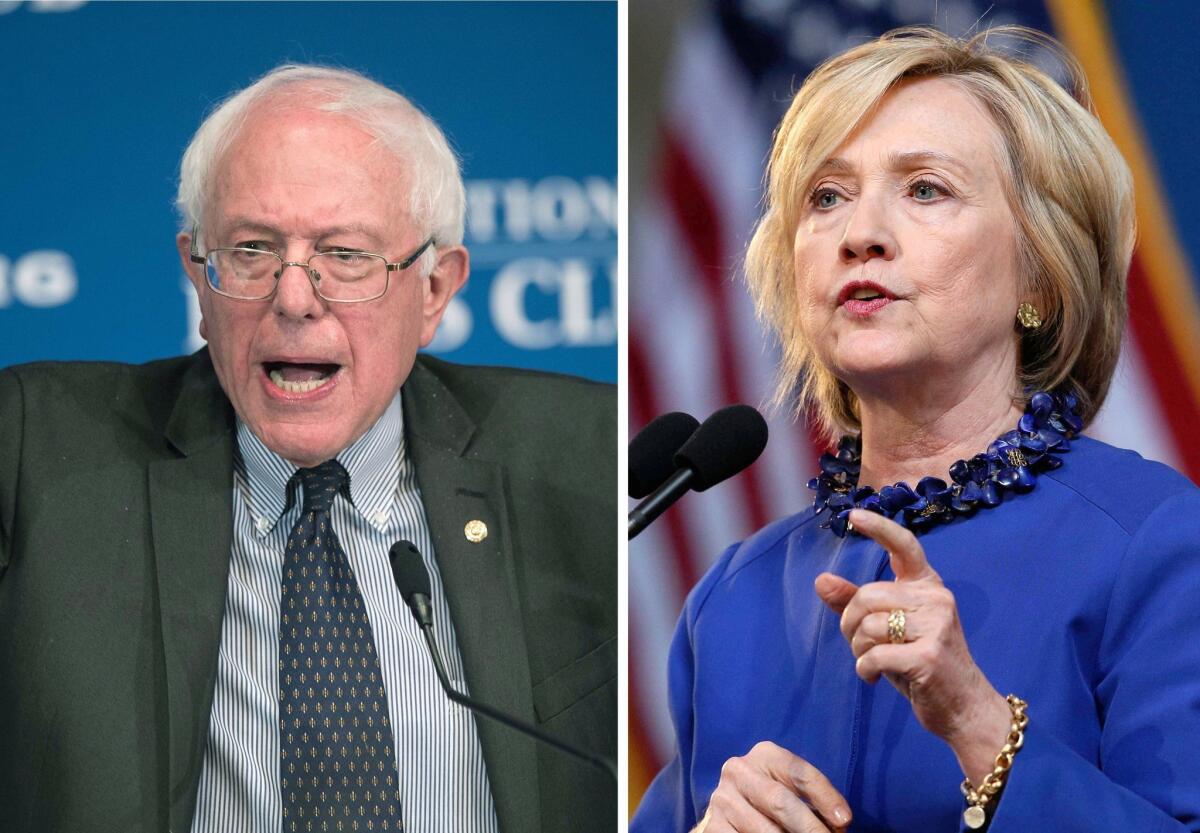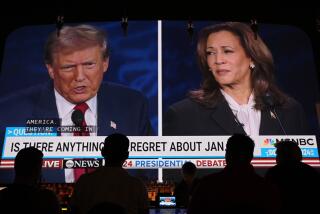Three things Clinton and Sanders need to do to win the debate

Democratic presidential candidates Sen. Bernie Sanders and former Secretary of State Hillary Clinton.
When the Democratic presidential candidates take the debate stage in Las Vegas on Tuesday, the main attraction will be a clash between Hillary Rodham Clinton and Sen. Bernie Sanders, the Vermont socialist who has defied expectations with his surge in the polls and impressive fundraising haul.
The two headliners will be sharing speaking time with a trio of also-rans: Former Maryland Gov. Martin O’Malley, former Sen. Jim Webb of Virginia and former Rhode Island Gov. Lincoln Chafee, all of whom are averaging at or below 1% in the polls.
For those relative unknowns, the debate is a do-or-die event: Either they distinguish themselves as viable and worthy alternatives to the frontrunners or they risk getting pushed out of the race.
TRAIL GUIDE: All the latest news on the 2016 presidential campaign >>
“It’s the only chance they have to break through,” said Democratic strategist Mark Mellman. “It’s hard to see them doing it anywhere else.”
Clinton and Sanders are looking for a different kind of turning point. Clinton needs badly to regain the mojo she had upon entering the race six months ago, when she seemed unstoppable. Sanders will set out to prove he is no flash-in-the-pan phenomenon but a viable, durable potential nominee.
Here are three things each of them needs to accomplish:
CLINTON
1. Move beyond the baggage
“This debate is a Hillary debate,” said Democratic pollster Peter Hart. The candidate who not long ago was considered the prohibitive front-runner could succeed in reminding Democrats why they had so much faith in her for so long, or she could confirm the doubts that have been in the minds of voters amid the unflattering headlines of recent months.
Clinton’s careful, guarded demeanor on the campaign trail – one of a cautious front-runner whose reluctance to go off script has sapped passion from her operation – seems to feed voter anxieties. She needs to get past the impression many Democrats have that she feels she deserves the nomination. They want to see her work for it, and to show she is battle-tested and won’t be sunk in a general election by her baggage (the emails, the foundation donations, the ties to billionaires, Whitewater, Travelgate, etc.)
“There are two potentialities,” Hart said. “One is the reassurance factor, that you put away all the news stories and all of the headlines and watch Hillary perform … and say, ‘this is a person who is not only competent, but she’s showing what I’d say is true heart.’”
“Or,” Hart said, “you look at Hillary through an unfiltered lens and say, ‘Hmmm, she doesn’t fit. She doesn’t feel right.’”
2. Redefine Bernie
The Clinton campaign strategy for dealing with Sanders has long been to largely ignore him. He was so far behind her and seemed to have such dim prospects for raising money and building an organization that there was nothing to be gained from engaging him.
That’s all changed. Sanders has become the odds-on favorite to win the important early voting state of New Hampshire. In the last fundraising quarter he hauled in almost as much as Clinton -- an impressive $26 million -- mostly in small-dollar donations. He is now moving beyond the early voting states and putting his resources to work building a presence nationwide.
Clinton needs to stop his momentum. The debate offers her an opportunity for a reality check on an opponent who hasn’t been held to the same standard as her by the media, which tends to cover Sanders more as a novelty and a social phenomenon.
Clinton may seek to define Sanders as a marginal player in Congress who is pushing a budget-busting agenda of European-style social programs that will hobble the economy – but she needs to do so delicately. Coming across as a bully or, worse, out of touch with the voter frustrations Sanders taps into, would only reinforce the suspicions progressives have about her.
“Given the dynamic, she needs to debate more than Sanders does,” said Andy Smith, director of the University of New Hampshire Survey Center. “She needs to change the tone of the campaign since the summer, when Sanders started heating up.”
3. Sand down the sharp edges
Showing a more human side has been a Clinton priority since the campaign began. But it’s an area where she continues to struggle. Clinton has tried to talk up her experiences as a grandmother, to mock herself on late-night television and to build her campaign launch around a van trip from New York to Iowa. But for many voters, it has all come across as staged.
The Snapchat page is only helping so much. Voters are far more likely to give Sanders points for authenticity than Clinton.
That’s a familiar problem for Clinton. She went through the same thing in 2008, when up against the grassroots momentum of Barack Obama. It wasn’t until she began to trail Obama that voters began to see the more personal, unguarded side of her, which they liked. Clinton will have no problem showing a command of issues. But voters will be looking for something more.
“At this stage in the contest, it is not so much about policy as personality,” said a Democratic campaign veteran who asked for anonymity to talk about the front-runner.
“Hillary Clinton needs to come across as competent and a strong leader, but she also needs to have a more engaging personality and sand down some of the sharp edges.”
SANDERS
1. Move beyond the Ben & Jerry voter
The Vermonter polls great among white liberals. And that’s all he may need to win the primary in a state like New Hampshire, next door to Vermont, or, for that matter, the Iowa caucuses.
But what next? You can’t win the Democratic nomination with weak minority support. Sanders has a lot of catching up to do.
As he transitions from a campaign focused on winning a couple of early states to a 50-state strategy that lays groundwork beyond Iowa and New Hampshire, the candidate needs to polish his message to minorities. He’s had some missteps, most notably when he tangled with activists from Black Lives Matter.
Clinton has proven more adept in communicating appreciation of the immigrant experience, outrage for Americans subjected to racial injustice and empathy for minorities suffering inequities.
Sanders is arguably more progressive on all of these issues, but his gruff, shouting delivery plays better in union halls than urban churches. As an elected official, he has long had one of the whitest constituencies in America. The debate will test how well he can adjust his message to a more diverse audience.
2. Don’t get tripped up on guns
One weak spot for Sanders with Democrats outside Vermont is his spotty record on gun control. Clinton will likely try to exploit it.
The issue goes back 20 years, when Sanders voted against the landmark Brady Bill, which mandated background checks for gun purchasers and restricted felons from purchasing firearms. He’s sided with the National Rifle Assn. on some other measures too. That comes with the territory of representing a rural state.
But the NRA is no fan of Sanders, who has cast ballots in favor of multiple gun control measures. It gives him a D-minus on its legislative scorecard.
Gun control is one of the few issues where Clinton is to the left of Sanders, and it is an emotional issue amid the recent school shootings.
3. Play nice
There is a cult of personality around Sanders, who is a straight-talking, cantankerous, unrepentant liberal. Activists in the party find it all endearing: the deep Brooklyn accent, the irritable responses to media questions, the rumpled suits.
But that package provides openings for Clinton, one of the most skilled debaters in politics, to draw Sanders into exchanges in which he won’t show well. Impatience and grumpiness are only charming to a point. Sanders will need to keep those tendencies in check as he faces a rival who will be particularly good at teasing them out.
If Sanders can keep his cool, even Clinton allies say he might be the favorite to win the debate.
“Front-runners usually lose debates,” said Paul Begala, a longtime friend and advisor to Bill and Hillary Clinton, “because all their rivals have to do is stand on the stage as an equal.”
For more on the 2016 campaign, follow @MarkZBarabak and @EvanHalper
SIGN UP for the free Essential Politics newsletter >>
MORE POLITICAL COVERAGE
Clinton and Sanders prepare for debate, and a new phase in the Democratic race
Hillary Clinton urges Las Vegas workers to say no to Donald Trump
With Democratic presidential debate looming, Bernie Sanders calls for tougher gun laws
More to Read
Get the L.A. Times Politics newsletter
Deeply reported insights into legislation, politics and policy from Sacramento, Washington and beyond. In your inbox three times per week.
You may occasionally receive promotional content from the Los Angeles Times.












